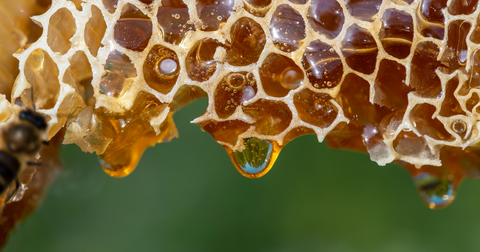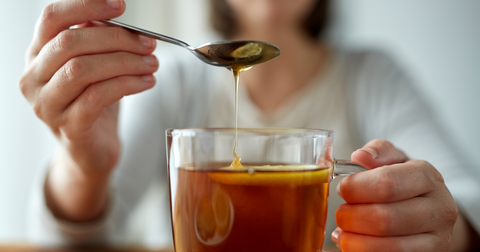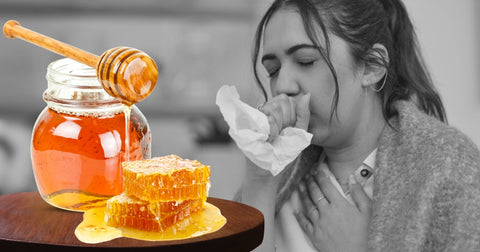Can Raw Honey Go Bad?

Raw honey is known for its natural longevity due to its antimicrobial properties, but its moisture content can vary depending on the season, the types of flowers from which nectar is gathered, and the region it is produced.
However, under certain conditions, it can degrade or spoil.
Here's how raw honey can go bad:
A. Storage

- Raw honey can go bad if exposed to improper storage conditions, such as heat, moisture, or light, which can degrade its enzymes and antioxidants.
- Honey with higher moisture content, often due to environmental factors, is more susceptible to fermentation or spoilage if exposed to humid conditions or not stored properly.
B. Contamination
- Contamination from unclean utensils or water can also spoil raw honey.
- Improper storage, such as keeping honey in a warm or humid place or leaving it unsealed, can lead to degradation in its quality.
C. Crystallization

- Crystallization is a natural process that doesn't indicate spoilage, excess moisture can lead to fermentation, causing sourness and bubbling.
Raw honey should be stored in a tightly sealed container in a cool, dry location to maintain its freshness.
Can Natural Honey Go Bad?
Natural Honey contains no added colours, artificial flavours, or synthetic ingredients, though it may be processed for longevity, smoothness and consistency.
Natural honey is often known for its longevity due to its natural antimicrobial properties. Still, its moisture content can vary significantly depending on the season, type of flowers, and regional conditions where the honey is harvested.
However, under certain conditions, even natural honey can go bad.
Here's 3 ways how it can happen:
A. Storage
- Natural honey can go bad due to improper storage conditions, such as exposure to heat, moisture, and light, which degrade its quality.
- Higher moisture content can increase the likelihood of fermentation or spoilage if honey is stored improperly.
B. Contamination
- Contamination from unclean utensils or water can lead to spoilage over time.
- Even though honey has an inherently long shelf life, environmental factors like heat, humidity, and storage conditions can cause it to degrade over time.
C. Crystallization
- Ageing can cause crystallization, darkening, and nutrient loss. Proper storage and handling help maintain honey's freshness and benefits.
It’s essential to store honey in a cool, dry place to preserve its quality and prevent fermentation, it should remain good for many years.
Can Organic Honey Go Bad?
Organic honey comes from bees raised on farms that follow strict organic livestock standards.
This ensures that the bees, flowers they pollinate, and the honey produced are free from pesticides, synthetic chemicals, and other non-organic substances. However organic honey can be pasteurized or processed.
Organic honey, like other natural honey, typically has a long shelf life due to its antimicrobial properties. However, its moisture content can vary depending on the season, the flowers from which the nectar is collected, and the region from which it’s sourced.
However, it can still go bad or degrade in quality under certain conditions.
Here are 3 ways how organic honey can go bad:
A. Storage
- Organic honey can go bad due to improper storage, such as exposure to heat, moisture, or sunlight, leading to fermentation or loss of quality.
- Higher moisture content can make honey susceptible to fermentation or spoilage, especially if not stored correctly.
B. Contamination
- Contamination from unclean utensils or water can also spoil it.
- Environmental factors like heat, humidity, and improper sealing can also cause honey to degrade in quality.
C. Crystallization
- Crystallization is natural and doesn't mean spoilage, it can affect the texture.
To preserve its natural goodness, organic honey should be stored in a cool, dry place and tightly sealed.
Can Pure Honey Go Bad?
Pure Honey simply means it has not been mixed with corn syrup, sugar, or other ingredients to dilute its natural quality.
Pure honey, while known for its long shelf life due to its natural antimicrobial properties, can still degrade or ferment under certain conditions. The moisture content of pure honey can vary based on factors like the season, the type of flowers bees collect nectar from, and the region it’s harvested.
Additionally, storing honey in warm environments or in containers that allow air exposure can accelerate its deterioration.
Here are 3 ways how pure honey can go bad:
A. Storage
- Pure honey can go bad due to improper storage conditions, such as exposure to heat, moisture, and light, which can degrade its quality.
- Honey with higher moisture content is more prone to fermentation, especially if it’s exposed to humidity or improperly sealed.
B. Contamination
- Contamination from unclean utensils or water can introduce bacteria, leading to spoilage.
C. Crystallization
- Crystallization is a natural process and does not indicate spoilage, excess moisture can cause fermentation, resulting in sourness.
To maintain the quality of pure honey, it’s essential to store it in a cool, dry place and ensure the container is airtight.
Can Manuka Honey Go Bad?
Manuka Honey is a unique honey made by bees pollinating the Manuka plant (Leptospermum scoparium), native to New Zealand and Australia. Known for its distinct flavour, it has strong antibacterial properties due to a compound called methylglyoxal (MGO).
Manuka honey, like other types of honey, is known for its natural antimicrobial properties. However, the moisture content of Manuka honey can vary depending on the region, seasonal conditions, and the flowers from which bees collect nectar.
However, over time, the quality of Manuka honey can go bad if it’s not stored properly.
Here are 3 factors that can affect its quality:
A. Storage
- If Manuka honey is exposed to high temperatures, direct sunlight, or moisture, it can crystallize or ferment, changing taste, texture, and colour.
- Honey with higher moisture content is more prone to fermentation, particularly if exposed to humidity or not stored correctly.
Learn more about the best storage methods? Check out our blog, "How To Store Honey: The Right Way!" for all the details!
B. Contamination
- If the jar is left open or honey is exposed to foreign substances like water or dust, it can encourage bacterial growth and spoilage.
- Over time, improper storage, such as exposure to heat, air, or humidity, can degrade the quality of Manuka honey.
C. Crystallization
- Crystallization is a natural occurrence and doesn't indicate spoilage, excess moisture can result in fermentation, making the honey sour.
Curious about the causes of honey crystallization and how to fix it? Dive into our blog, "Honey Crystallization: Causes & Quick Solutions" for all the insights!
To preserve its unique properties, it’s important to store Manuka honey in a cool, dry place and a tightly sealed container.
Preserving the Purity
While honey is known for its remarkable longevity due to its natural antimicrobial properties, factors like moisture content shaped by seasons, floral sources, and regions can influence its shelf life. Storing honey properly, away from heat, humidity, and air, is essential to preserving its quality.
Honey and Spice offers a variety of natural, organic, pure, raw, and Manuka honey that showcase the richness and benefits of nature’s finest nectar. By storing honey in cool, dry places and ensuring it's sealed properly, you can enjoy its natural goodness for years.







